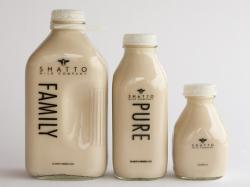Root Beer Milk Awarded Best At World Competition
October 7, 2011 | 2 min to read

The World Dairy Exposition in Madison, Wisconsin awarded Shatto Root Beer Milk first place in the Open Class category for the second year in a row. This year’s contest received a record 705 entries for cheese, butter, fluid milk, yogurt, etc. from all over the world.
Each year people involved in all aspects of the dairy industry flock to the World Dairy Expo. The World Dairy Expo serves as a forum for dairy producers, companies and organizations to come together to compete, and to exchange ideas, knowledge, technology and commerce.
“We are just thrilled by this wonderful news. It is amazing to think that the milk from our small family dairy farm here outside of the Kansas City area has been recognized as some of the best in the entire world” said The Shatto Family. “We are humbled by these results and are so excited that we can offer our customers such a variety of high quality products!”
Shatto added, “As you can imagine, we are very excited to be able to share this news with our loyal customers and friends in the area.”
This outstanding news comes only one year after Shatto 2% Root Beer, and Strawberry were individually named one of the top three in the world in 2010 and two years after Shatto Chocolate Milk was named one of the top three chocolate milks in the world during the 2009 World Dairy Expo Dairy Products Competition.
The Shatto Family began delivering farm-fresh milk from their family farm, just 35 minutes North of Kansas City, to select supermarkets in June, 2003. The Shatto’s also opened a Country Store at the dairy and began offering tours of their farm and bottling facility. The Shatto’s go to great lengths to offer such wonderful products to the public. The cows are well cared for and are offered only the finest feed, in addition to all the grass they want to eat. “Freshness makes a huge difference with all dairy products and we are fortunate to be able to get our milk from our cows to the stores in as little as 12 hours. It’s the freshest milk available in Kansas City.” said Shatto.
Shatto Milk Company uses milk only from its own cows which are not treated with artificial growth hormones. The milk is processed into whole, 2 percent, 1 percent, skim, chocolate, root beer, strawberry, banana, and orange flavors, butter and cream. Recently the Shatto’s began offering Ice Cream and Cheese as well as Shatto Milk Soap, which is also made using their farm fresh milk. For a list of the supermarkets carrying Shatto Milk Company products, contact Shatto Milk Company at (816) 930-3862 or visit their website at www.shattomilkcompany.com.
Shatto Milk Company is located at 9406 N. Hwy 33, Osborn MO 64474. The farm is situated on Highway 33, 4 miles south of US 36 and 6 miles north of Missouri 116, accessible from both I-35 and I-29. A complete map is available on the Shatto’s website at www.shattomilk.com.
Source: Shatto Milk Company
